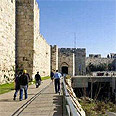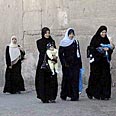
Jerusalem is still important city
Photo: Moshe Milner, GPO

Arabs, Jews neighbors in capital
Photo: Haim Tzach
I've been thinking about Jerusalem a lot lately, and not just because I live here. The city has been mentioned in the local media, usually in a derogatory tone. I can't count the number of disparaging articles that have been written by secular Israelis trashing the town and saying loudly that they are pulling up stakes for Tel Aviv.
The conventional wisdom is that Jerusalem is going to be too "black" (that is, ultra-Orthodox), too Arab and, as a result of the first two conditions, too poor to be an important city.
Then, of course, there are the political issues: "solving" the "problem" of how to divide - or not - Jerusalem between Israel and "Palestine" is usually referred to as the thorniest of issues facing the opposing parties. Oslo and other interim agreements have generally pushed a resolution of the Jerusalem issue to the end of the process (not that we've even gotten that far down the road in the peace process).
But once again, I'm here to tell you that the conventional wisdom is wrong. From where I sit, on a lovely hill in southern Jerusalem with great views in four directions within a few blocks' walk, it is becoming clear that Jerusalem may point the way to a brighter future of two countries living side by side.
Further, Jerusalem is developing a rich and sophisticated cultural life of its own rooted both in our past and in our future, and not so trendy and international as to be without Jewish or Israeli connection, as is sometimes the case with so-called secular Hebrew culture based in Tel Aviv.
East Jerusalem is its own place
First, a reality check: east Jerusalem is its own place, an alternate reality from Israel - a parallel universe if you like sci-fi, a foreign country, if you like. They may use the same services we do: the shekel (although during a recent visit I saw a lot of US dollars change hands), Bezeq telephone service and Israeli HMO's, but it is a different place.
The hotels have English-language pamphlets titled, "This Week in Palestine," with ads for "the only luxury hotel in Ramallah," art exhibits, and restaurants few in Israel proper have ever patronized or even heard of.
The occasion for my visit was a walking tour led by artist Azriel Cohen to east Jerusalem cafes and restaurants he has painted as part of a multiyear project (www.jerusalemcafes.com).
The good news is that this tour and Cohen's project is getting people - a handful of coffee-junkies and cafe proprietors at least - talking to one another. Cohen's exhibit is at Seeds of Peace (www.seedsofpeace.org), which recently hosted him and cafe owners from east and west for an evening of food, stories and connections.
Then there is the small success by which residents of Jerusalem, primarily its East Talpiot neighborhood (coincidentally or not, technically over the Green Line) and their Arab neighbors in the village of Jabel Mukaber successfully worked together to get the route of the security barrier changed so the Arab town that borders East Talpiot wouldn't be arbitrarily divided by the fence.
Jabel Mukaberites recently hosted their neighbors in celebration of that event.
Meeting your neighbors
These are not major events; they received little media coverage. They were not organized and funded by the EU, US or UN. They didn't require committees, meetings, boards, seminars, and reports.
Finally, there are also a number of cultural events that "cross the border" these days, even if both sides generally keep to themselves. People are justifiably right to enjoy their familiar surroundings on a day to day basis.
Occasional forays and gatherings improve the quality of life; but many people are comfortable staying with their own. In and of itself, that isn't a bad thing, either.
The simple fact is that Israeli and Jewish Jerusalemites have far more contact with their Arab neighbors, and Arab Jerusalemites have more exposure to Israeli Jews than most folks in the country. There are far more Romanians, Thais and Chinese in Tel Aviv than Arabs these days, no?
Leaving out the extremists on both sides (we'll deal with them in another column, at another time), it seems to me that if Jerusalemites can begin talking to one another they can perhaps forge a way for real dialogue between Palestinians and Israelis.
Alan D. Abbey is Founding Editor of Ynetnews. His Web site is www.abbeycontent.com and his email is alan@abbeycontent.com















